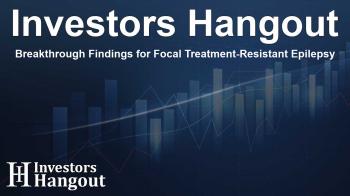Breakthrough Findings for Focal Treatment-Resistant Epilepsy

Promising Insights from the Human Epilepsy Project
The latest findings from an extensive international study have brought encouraging news for patients dealing with focal treatment-resistant epilepsy (FTRE). It is a condition that has often left many feeling hopeless. This significant research, known as the Human Epilepsy Project 2 (HEP2), reveals that patients can experience improvement in their condition over time, particularly when receiving appropriate treatment.
Understanding the Scope of the Study
The HEP2 study, conducted by the Epilepsy Foundation of America and New York University, tracked the progress of 146 participants from diverse backgrounds who have struggled with FTRE. The participants, aged between 16 and 65, had a history of uncontrolled focal seizures, having tried multiple medications without success. The study monitored various aspects important to patients, such as seizure frequency, treatment regimens, associated comorbid conditions like anxiety and depression, healthcare expenses, and overall quality of life.
Key Findings That Inspire Hope
Interestingly, of those who participated in the study, about 63% showed a notable reduction in seizure frequency. Results indicated that the type of treatment—whether it involved devices like vagus nerve stimulation or changes in antiseizure medication—did not significantly affect the overall seizure reduction experienced by patients. This suggests that while certain treatments can be beneficial, the improvement observed was not necessarily tied to a particular approach.
Dr. Jacqueline French, the Medical Director of the Epilepsy Foundation of America, provided a compelling analogy, stating that finding the right treatment for FTRE patients can be akin to searching for a key that unlocks a door to their brain's control over seizures. With collaborative efforts between patients and healthcare providers, patients can discover solutions that improve their symptoms over time.
Broader Implications for Epilepsy Care
The HEP2 study is just one part of a larger initiative aiming to enhance the understanding and treatment options for those with epilepsy. According to Dr. Ojas Potnis, the findings break the misconception that patients with FTRE must inevitably face a deteriorating condition. Instead, they present a sense of hope, illustrating that patients experiencing frequent focal seizures can look forward to a more positive trajectory if equipped with the right treatments.
A staggering 3.4 million individuals in the U.S. live with epilepsy, characterized by abnormal electrical activity in the brain resulting in seizures. Focal epilepsy, which is the most prevalent type, occurs when seizure activity is confined to a specific area of the brain, significantly affecting the lives of those impacted.
About Epilepsy and Its Impact
Epilepsy is recognized as the most common chronic brain disorder, spanning a wide demographic of individuals regardless of age or background. As noted by the CDC, nearly 3.4 million Americans experience active epilepsy, which manifests through unpredictable seizures that can disrupt everyday life. Besides seizures, individuals may face issues like fatigue, memory lapses, changes in mood, anxiety, and difficulties in concentration that profoundly affect their quality of life.
Epilepsy Foundation of America: A Beacon of Support
The Epilepsy Foundation of America plays a pivotal role in enhancing the lives of those affected by epilepsy. For over 50 years, the Foundation has tirelessly championed education, advocacy, and research aimed directly at improving care. They strive to raise awareness about the condition while working to eliminate stigmas associated with epilepsy. Furthermore, the Foundation actively funds groundbreaking research and nurtures emerging investigators in search of new therapies and treatments.
With a wide-reaching network of local offices and community partners, the Foundation ensures that individuals have greater access to necessary care. They offer crucial training in seizure recognition and first aid, alongside providing direct support for those in need.
Frequently Asked Questions
What is the Human Epilepsy Project?
The Human Epilepsy Project is a collaborative research initiative aimed at improving the treatment and understanding of epilepsy, particularly for patients with treatment-resistant forms of the condition.
What were the main findings of the HEP2 study?
The HEP2 study found that a significant portion of patients with focal treatment-resistant epilepsy showed improvements in seizure frequency over time with appropriate treatment.
Who conducted the HEP2 study?
The study was conducted by the Epilepsy Foundation of America in partnership with New York University.
How does the study impact the perception of treatment-resistant epilepsy?
The study provides hope by suggesting that treatment-resistant epilepsy can improve over time, challenging the belief that it will worsen.
How can one learn more about epilepsy and available resources?
For further information on epilepsy and resources, visiting epilepsy.com or contacting local epilepsy organizations would be beneficial.
About The Author
Contact Riley Hayes privately here. Or send an email with ATTN: Riley Hayes as the subject to contact@investorshangout.com.
About Investors Hangout
Investors Hangout is a leading online stock forum for financial discussion and learning, offering a wide range of free tools and resources. It draws in traders of all levels, who exchange market knowledge, investigate trading tactics, and keep an eye on industry developments in real time. Featuring financial articles, stock message boards, quotes, charts, company profiles, and live news updates. Through cooperative learning and a wealth of informational resources, it helps users from novices creating their first portfolios to experts honing their techniques. Join Investors Hangout today: https://investorshangout.com/
The content of this article is based on factual, publicly available information and does not represent legal, financial, or investment advice. Investors Hangout does not offer financial advice, and the author is not a licensed financial advisor. Consult a qualified advisor before making any financial or investment decisions based on this article. This article should not be considered advice to purchase, sell, or hold any securities or other investments. If any of the material provided here is inaccurate, please contact us for corrections.

